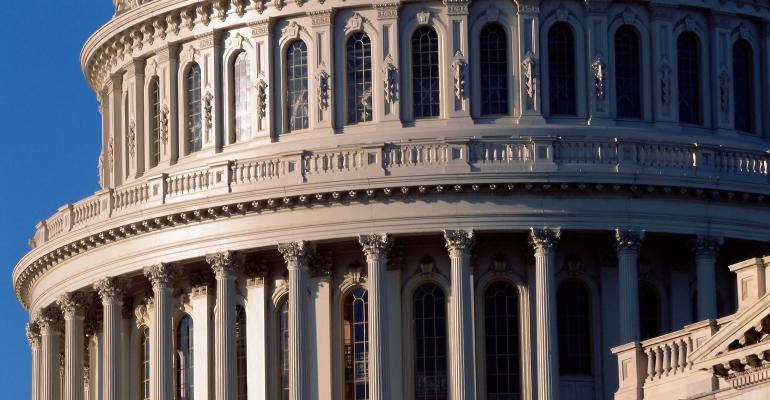Recent guidance from the SEC suggested that registered investment advisors who accept a Paycheck Protection Program (PPP) loan will have to disclose it on their Form ADV. FINRA-regulated brokers, however, are not under the same mandate, leading some to argue that advisors who are federally regulated by the SEC may be at a disadvantage if they are perceived by potential clients to be less financially sound.
Dan Bernstein, the chief regulatory counsel at MarketCounsel, said the critique is similar to those raised against the commission’s Regulation Best Interest rule; while it purports to strengthen scrutiny and regulation on broker/dealers around the country, Bernstein and other advisor advocates argued that it puts SEC-regulated financial advisors at a disadvantage. Bernstein worried the problem may be compounded if clients take a negative view of firms that accept PPP loans.
“Firms may say ‘we needed to take money from the government because of the uncertainty,’ and the client will look at a broker/dealer’s Form CRS, and it’s not going to say that,” Bernstein said. “And maybe in the back of their head, they’re going to say, ‘I’m going with the one that seems more solvent.’”
The PPP was originally included in the CARES Act, which passed in late March in an attempt to offset the economic calamity suffered as a result of the spread of COVID-19 and the ensuing economic lockdown.
Advisors have constantly been stymied by the application process, from concerns and confusion about how to apply, and even whether pursuing a loan application was ethically sound.
Advisors also were concerned about the types of disclosure obligations that might apply to accepting a PPP loan; the SEC responded by releasing guidance last week in the form of an updated FAQ from the Division of Investment Management. According to the commission, if a firm is experiencing conditions that “are reasonably likely to impair its ability to meet contractual commitments to its clients,” it may have to disclose that it accepted a PPP loan as a part of Item 18 on its Form ADV.
“If the circumstances leading you to seek a PPP loan or other type of financial assistance constitute material facts relating to your advisory relationship with clients, it is the staff’s view that your firm should provide disclosure of, for example, the nature, amounts and effects of such assistance,” the FAQ read.
While this makes it highly likely that a firm taking a PPP loan would be required to disclose it, each firm would have to determine itself whether it is material to the advisory relationship, according to Gail Bernstein, general counsel for the Investment Adviser Association; such a determination would have to be made on a case-by-case basis, she said.
“Just taking an ordinary course loan to continue with operations would not necessarily trigger Item 18, so advisors would have to look at their own facts and circumstances to decide how their PPP loan applies,” she said. “What’s the basis of applying for PPP and do you need PPP under the terms of the program, and are those reasons the same thing as being likely to impair your commitment to clients?”
Under FINRA rules, firms must disclose on their regulatory forms any “compromise” with creditors—leading some to argue the PPP loan being a forgivable loan if all conditions are met—meets that hurdle.
But that’s not the case. According to guidance from the regulatory agency released in mid-April, no disclosures of the PPP loan are required by FINRA.
Todd Pouliot, president of Gateway Financial, hoped that FINRA-regulated brokers would take it upon themselves to disclose such a loan but said it was likely that many would choose not to do so if it was not required.
He argued that the difference between FINRA and SEC requirements meant brokers and advisors were not on a “level playing field” in regard to PPP loan disclosures, and the exception FINRA made for brokers concerning their Form U4 could end up being a mistake.
“I question whether FINRA understands what they’re doing. They’re making an exception when they shouldn’t; long term, this is damaging to its credibility and its disclosure documents,” he said. “I would advise FINRA to abide by the rules and regulations they operated on prior to PPP; I don’t think they should change the rules on one type of loan. A compromise on a creditor is still a compromise on a creditor.”
Dan Bernstein noted that the guidance from the SEC was not a mandated rule, but an “off-the-cuff” interpretation, but firms need to determine whether they’re eligible and whether they’re willing to make that disclosure to clients. While some advisors have worried that these loans would be considered as a strike against their business, Bernstein asserted that advisors need to assume that these loans will eventually become public.
“This is not to blame the government and the SEC,” he said. “When you do things fast, you don’t always get the best guidance. The Dodd/Frank Act is still not fully implemented in regard to the rules. Sometimes rules take years to develop, not days or weeks.”




